 Stephanie Benzaquen-Gautier, ERC Research Fellow, ‚Cultures of Occupation in Twentieth Century Asia‘ (COTCA), Univ. of Nottingham, UK (Web)
Stephanie Benzaquen-Gautier, ERC Research Fellow, ‚Cultures of Occupation in Twentieth Century Asia‘ (COTCA), Univ. of Nottingham, UK (Web)
Venue: Kuala Lumpur
Time: 15.-17.09.2020
Proposals by: 15.04.2020
The aim of this workshop is to explore the ways in which the body mediates between different levels, agents, forms, spaces, and media of occupation. In turns savage, ‘civilized’, tortured, enslaved, resisting, fetishized or ‘emancipated’, the body fills stories of occupation. In a variety of arenas, such as law, health, trade, social activities, family life, beliefs and rituals, it constitutes a major site of interaction between the ‘occupier’ and the ‘occupied’. To what extent does a bodily perspective make possible to write histories of violence and domination ‘from below’? Through which methodologies, sources, and materiality can we approach bodies of occupation? What does the shift from the narrative to the performative produce in terms of critical knowledge about ‘occupation’?
These and others are the questions the workshop proposes to address. ‘Occupation’ is defined in a broad sense, including ‘high intensity’ forms (e.g., imperialism, settler colonialism, military operations, political repression, extractivism, neoliberal use of bodies as productive/reproductive machines) and ‘low intensity’ forms (e.g., transitional justice initiatives, ‘soft power’, economic investments, mass tourism). With this large scope, the workshop aims to foreground continuity across a range of temporalities, locations, and topographies of occupation, and then emphasise the linkages between historical, political, structural, and ‘slow’ violence.
Topics include – but are not limited to:
- Discipline and the body as a site of power relations
- The ‘body as spectacle’ and the visual archive of occupation
- Territories and practices of gendered occupation
- Bodily performances of resistance, identity, and intersectionality
- Ecologies and embodied legacies of occupation. Read more and source … (Web)
